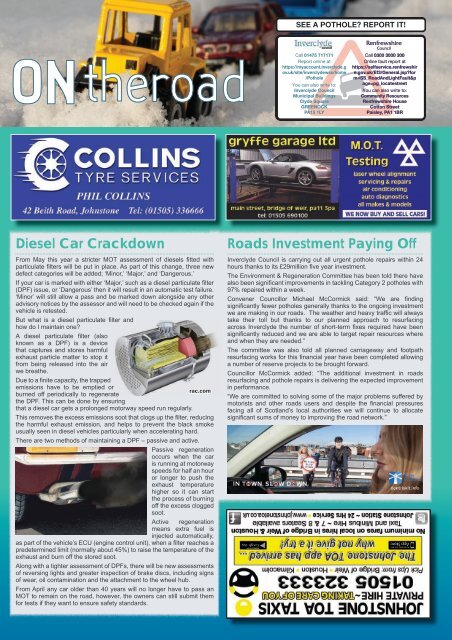282 March 2018 - Gryffe Advertizer
The Advertizer - Your local community magazine to the Gryffe area. The Advertizer is a local business directory including a what's on guide and other local information and an interesting mix of articles.
The Advertizer - Your local community magazine to the Gryffe area. The Advertizer is a local business directory including a what's on guide and other local information and an interesting mix of articles.
Create successful ePaper yourself
Turn your PDF publications into a flip-book with our unique Google optimized e-Paper software.
january march <strong>2018</strong> <strong>2018</strong><br />
t: 01505 613340 e: info@advertizer.co.uk<br />
SEE A POTHOLE? REPORT IT!<br />
5<br />
51<br />
Call 01475 717171<br />
Report online at<br />
https://myaccount.inverclyde.g<br />
ov.uk/site/inverclydewss/home<br />
/Pothole<br />
You can also write to:<br />
Inverclyde Council<br />
Municipal Buildings<br />
Clyde Square<br />
GREENOCK<br />
PA15 1LY<br />
Call 0300 3000 300<br />
Online fault report at<br />
https://selfservice.renfrewshir<br />
e.gov.uk/Ef3/General.jsp?for<br />
m=SS_RoadAndLightFault&p<br />
age=pg_locatestreet<br />
You can also write to:<br />
Community Resources<br />
Renfrewshire House<br />
Cotton Street<br />
Paisley, PA1 1BR<br />
Diesel Car Crackdown<br />
From May this year a stricter MOT assessment of diesels fitted with<br />
particulate filters will be put in place. As part of this change, three new<br />
defect categories will be added; ‘Minor,’ ‘Major,’ and ‘Dangerous.’<br />
If your car is marked with either ‘Major,’ such as a diesel particulate filter<br />
(DPF) issue, or ‘Dangerous’ then it will result in an automatic test failure.<br />
‘Minor’ will still allow a pass and be marked down alongside any other<br />
advisory notices by the assessor and will need to be checked again if the<br />
vehicle is retested.<br />
But what is a diesel particulate filter and<br />
how do I maintain one?<br />
A diesel particulate filter (also<br />
known as a DPF) is a device<br />
that captures and stores harmful<br />
exhaust particle matter to stop it<br />
from being released into the air<br />
we breathe.<br />
Due to a finite capacity, the trapped<br />
emissions have to be emptied or<br />
rac.com<br />
burned off periodically to regenerate<br />
the DPF. This can be done by ensuring<br />
that a diesel car gets a prolonged motorway speed run regularly.<br />
This removes the excess emissions soot that clogs up the filter, reducing<br />
the harmful exhaust emission, and helps to prevent the black smoke<br />
usually seen in diesel vehicles particularly when accelerating hard.<br />
There are two methods of maintaining a DPF – passive and active.<br />
Passive regeneration<br />
occurs when the car<br />
is running at motorway<br />
speeds for half an hour<br />
or longer to push the<br />
exhaust temperature<br />
higher so it can start<br />
the process of burning<br />
off the excess clogged<br />
soot.<br />
Active regeneration<br />
means extra fuel is<br />
injected automatically,<br />
as part of the vehicle’s ECU (engine control unit), when a filter reaches a<br />
predetermined limit (normally about 45%) to raise the temperature of the<br />
exhaust and burn off the stored soot.<br />
Along with a tighter assessment of DPFs, there will be new assessments<br />
of reversing lights and greater inspection of brake discs, including signs<br />
of wear, oil contamination and the attachment to the wheel hub.<br />
From April any car older than 40 years will no longer have to pass an<br />
MOT to remain on the road, however, the owners can still submit them<br />
for tests if they want to ensure safety standards.<br />
Roads Investment Paying Off<br />
Inverclyde Council is carrying out all urgent pothole repairs within 24<br />
hours thanks to its £29million five year investment.<br />
The Environment & Regeneration Committee has been told there have<br />
also been significant improvements in tackling Category 2 potholes with<br />
97% repaired within a week.<br />
Convener Councillor Michael McCormick said: “We are finding<br />
significantly fewer potholes generally thanks to the ongoing investment<br />
we are making in our roads. The weather and heavy traffic will always<br />
take their toll but thanks to our planned approach to resurfacing<br />
across Inverclyde the number of short-term fixes required have been<br />
significantly reduced and we are able to target repair resources where<br />
and when they are needed.”<br />
The committee was also told all planned carriageway and footpath<br />
resurfacing works for this financial year have been completed allowing<br />
a number of reserve projects to be brought forward.<br />
Councillor McCormick added: “The additional investment in roads<br />
resurfacing and pothole repairs is delivering the expected improvement<br />
in performance.<br />
“We are committed to solving some of the major problems suffered by<br />
motorists and other roads users and despite the financial pressures<br />
facing all of Scotland’s local authorities we will continue to allocate<br />
significant sums of money to improving the road network.”<br />
@<strong>Gryffe</strong>Ads www.advertizer.co.uk


















